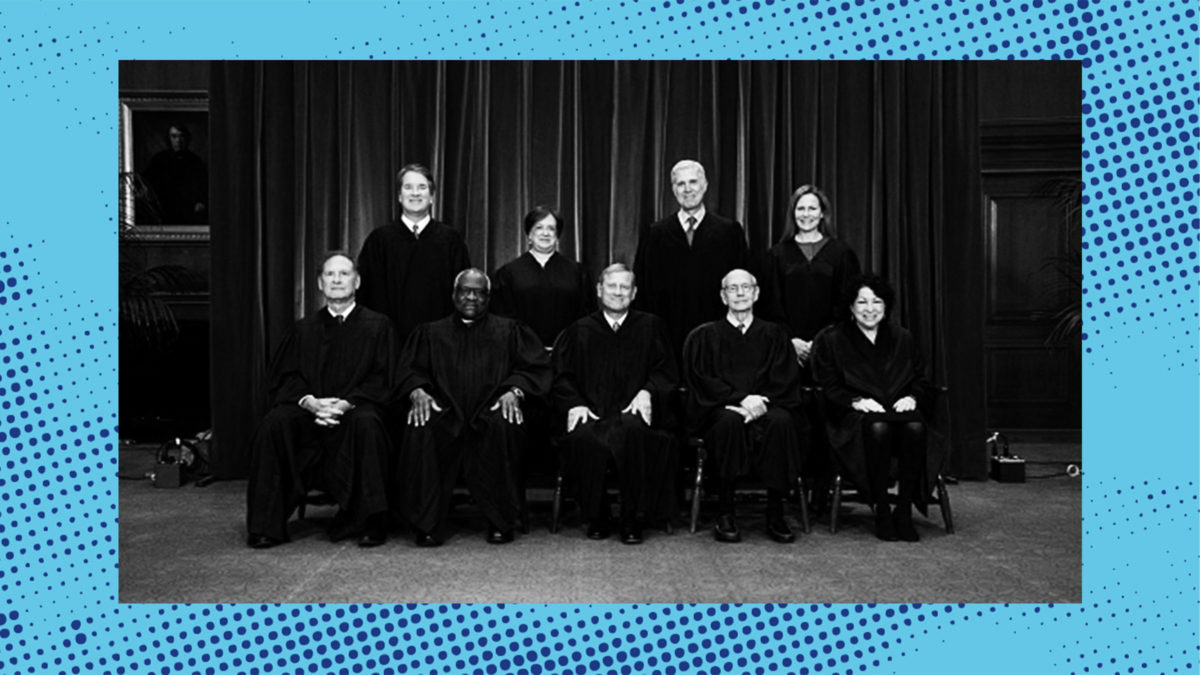The Conservative Justices Are Ready to Bring Government to a Grinding Halt
The COVID-19 pandemic is an unprecedented crisis that only bold, innovative action can address. For John Roberts and company, that’s a problem.
SUPREME COURT
BY HANNAH MULLEN JANUARY 7, 2022

Earlier today, the Supreme Court heard oral argument in challenges to two of the Biden administration’s higher-profile efforts to end the COVID-19 pandemic. In the first case, National Federation of Independent Business v. Department of Labor, an array of well-heeled business groups, conservative organizations, and red-state governments challenged the administration’s rule that requires private employers to implement either a vaccine mandate or, for unvaccinated employees, a testing-and-masking policy in the workplace. In the second, Biden v. Missouri, red states objected to a separate vaccine mandate for employees of health care providers—hospitals, clinics, and so on.
Despite the radical right-wing leanings of this 6-3 Court, the administration has at least a chance of prevailing in the healthcare provider case. Chief Justice John Roberts and Justice Brett Kavanaugh asked skeptical questions of the state challengers at oral argument, suggesting that they might join their three liberal colleagues and vote to uphold the rule.
The good news stops there. The conservative justices appear eager to strike down the vaccine-or-test mandate, which covers an estimated 84 million people. This result would do more than hobble the nation’s already-insufficient response to COVID-19. It would also advance the conservative legal movement’s decades-long campaign to kneecap the federal government’s ability to effectively address other unfolding crises.
The Biden administration’s authority to require basic public-health measures in the workplace is crystal-clear. In a statute passed in 1970, Congress required the Occupational Health and Safety Administration to issue an “emergency temporary standard” regulating workplace conditions when the agency determines that such a standard is “necessary” to protect employees from a “grave danger” resulting from exposure to “physically harmful” “new hazards.” The agency promulgated the vaccine-or-test rule last year after examining data and evidence on the dangers of COVID-19 in the workplace, and the efficacy of vaccines, masking, and testing. As it turns out, a contagious disease that has killed more than 800,000 Americans and is entering its third year counts as a “grave danger.”
That should be the end of the case: Congress authorized a particular category of agency action, and the agency reasonably invoked that power to regulate employers commensurate with the danger their employees face. But for the right-wing justices, when an agency takes action to address an especially important problem—for example, a deadly pandemic—an ordinary congressional grant of authority is not enough. Rather, Congress must have specifically anticipated that problem and explicitly authorized the agency to take that particular measure to address it.
At oral argument, the conservatives repeatedly invoked this expansive made-up rule, which is known in legal circles as the “major questions doctrine.” Roberts asked Solicitor General Elizabeth Prelogar, who argued in defense of the vaccine-or-test mandate, to confirm that mandating vaccine coverage is “something that the federal government has never done before.” He also remarked that he didn’t think that Congress “had COVID in mind” in 1970, when it passed the Occupational Safety and Health Act, and observed that 1970 “was almost closer to the Spanish Flu than it is to today’s problem.” The Chief Justice didn’t expand on why Congress’s inability to predict the onset of COVID-19 five decades ago is evidence that Congress wouldn’t have wanted the government empowered to do anything about it.
No comments:
Post a Comment